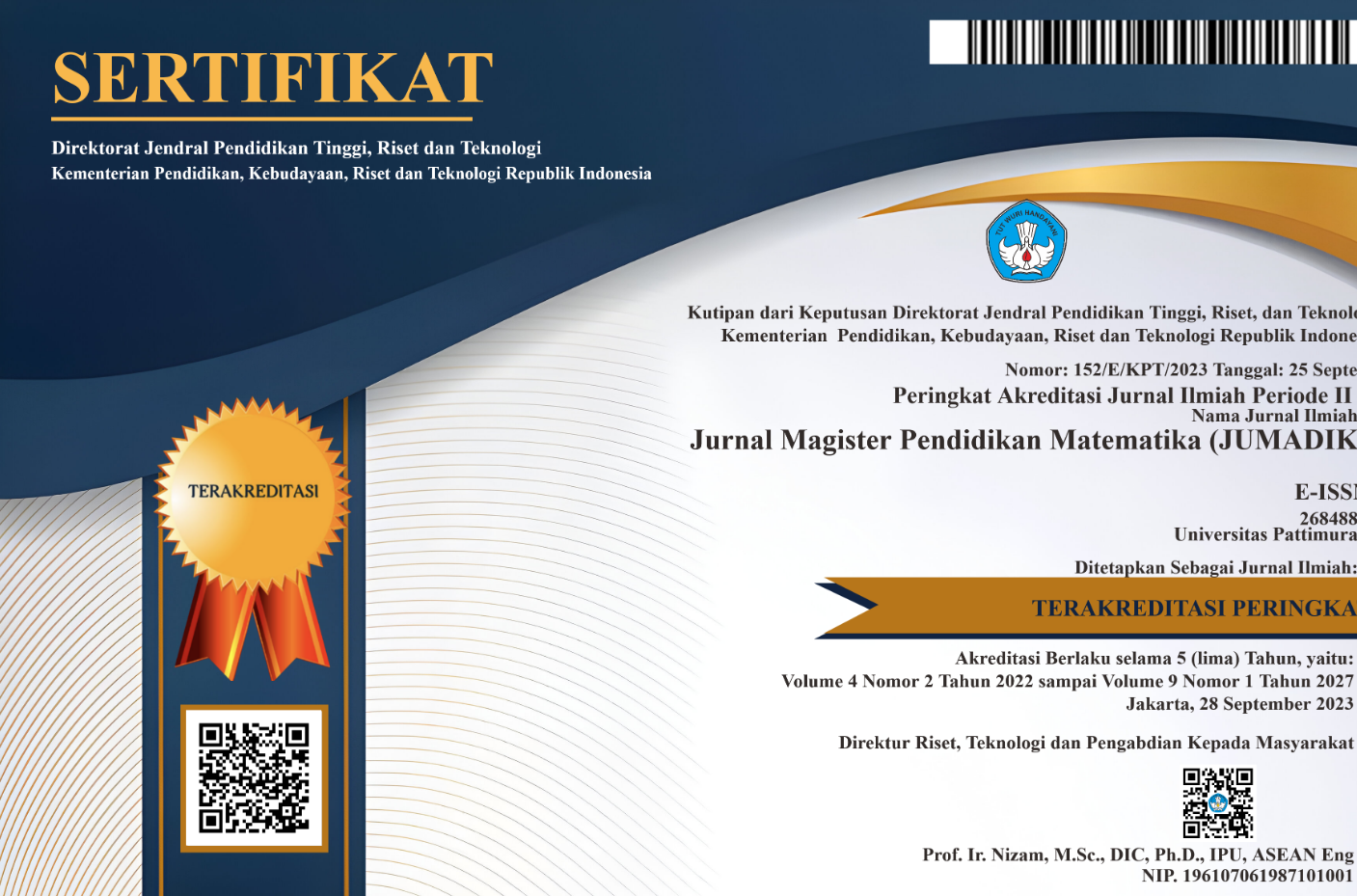KEMAMPUAN ANALISIS PESERTA DIDIK MTs NEGERI 1 MALUKU TENGGARA DALAM MENYELESAIKAN MASALAH MATEMATIKA
Abstract
Analysis skills is an ability that plays an important role for students in solving a problem. Students must be able to identify an element, apply strategies and conclusions in solving problems, make decisions, arrange problem elements and determine relationships in their settlement. High Order Thinking Skills (HOTS) are thinking skills at a higher level that require students to be able to think critically and creatively by describing parts of the information obtained, finding relationships between parts, constructing and finding solutions to the problems they face. The purpose of this study was to describe students' analytical abilities in solving mathematical problems with the High Order Thinking Skills (HOTS) type in statistics material. This study used a qualitative descriptive research method with the research subjects being class VIII students for the 2021/2022 academic year at MTs Negeri 1 Maluku Tenggara. The instrument in this study was a test item consisting of 2 High Order Thinking Skills (HOTS) questions on statistics. The results of the study showed that students fulfilled the analytical indicator abilities in the differentiating, organizing, and attributing phases
Downloads
References
Agustina, L. (2016). Upaya meningkatkan kemampuan pemahaman konsep dan pemecahan masalah matematika siswa SMP Negeri 4 Sipirok kelas VII melalui pendekatan matematika realistik (PMR). EKSAKTA: Jurnal Penelitian Dan Pembelajaran MIPA, 1(1).
Anderson, L. W., & Krathwohl, D. R. (2010). Kerangka landasan untuk pembelajaran, pengajaran, dan asesmen. Yogyakarta: Pustaka Pelajar.
Aryani, I., & Maulida, M. (2019). Analisis Kesalahan Siswa dalam Menyelesaikan Soal Matematika melalui Higher Order Thinking Skill (HOTS). Jurnal Serambi Ilmu, 20(2), 274-290.
Assegaff, A., & Sontani, U. T. (2016). Upaya meningkatkan kemampuan berfikir analitis melalui model problem based learning (PBL). Jurnal Pendidikan Manajemen Perkantoran (JPManper), 1(1), 38-48.
Dewi, S. V. 2013. Pengaruh Pembelajaran dengan Pendekatan Pemecahan Masalah Terhadap Peningkatan Kemampuan Analisis dan Sintesis Matematis Siswa SMK (Doctoral Dissertation, Universitas Pendidikan Indonesia).
Dinni, H. N. (2018, February). HOTS (High Order Thinking Skills) dan kaitannya dengan kemampuan literasi matematika. In PRISMA, Prosiding Seminar Nasional Matematika (Vol. 1, pp. 170-176)..
Fahrina, F., Jamal, A., & Salam, A. 2018. Meningkatkan Kemampuan Analisis Sintesis Siswa Kelas X MIA 6 SMA Negeri 2 Banjarmasin melalui Model Pengajaran Langsung dengan Metode Problem Solving. Berkala Ilmiah Pendidikan Fisika, 6(1), 98-117.
Mahyastuti, I., Dwiyana, D., & Hidayanto, E. (2020). Kemampuan berpikir analitis siswa dalam memecahkan masalah matematis. Jurnal Pendidikan Matematika dan Sains, 8(1), 1-6.
Mardiyati, I. (2017). Tingkat Kemampuan Analisa Dan Sintesa Mahasiswa Jurusan Pendidikan Guru Raudhatul Athfal Ftik Iain Pontianak Ta. 2016/2017. Khatulistiwa: Journal of Islamic Studies, 7(2).
Mataheru, Wilmintjie. 2019. Proses Kognitif dalam Pemecahan Masalah. Bandung: Alfabeta.
Nani, K. L. 2015. Kemampuan Penalaran Statistis, Komunikasi Statistis, dan Academic Help-Seeking Mahasiswa Melalui Pembelajaran Berbasis Proyek Berbantuan ICT (Doctoral dissertation, Universitas Pendidikan Indonesia).
Nilah, & Riszulfah Roza. 2020. Analisis Kemampuan Berpikir Analitis dan Evaluasi dalam Pembelajaran Fisika pada Topik Usaha dan Energi. Prosiding Seminar Nasional Fisika Universitas Negeri Jakarta.
Nisa, S., Zulkardi, Z., & Susanti, E. (2019). Kemampuan penalaran statistis siswa pada materi penyajian data histogram melalui pembelajaran PMRI. Jurnal Pendidikan Matematika, 13(1), 21-40.
Sartika, Septi Budi, & Ermawati Zulikhatin Nuroh. (2017). Peningkatan Keterampilan Berpikir Analisis Siswa SMP Melalui Pembelajaran IPA Terpadu Berbasis Keterampilan Proses Sains. Prosiding Seminar Nasional Pendidikan Universitas Muhammadiyah Sidoarjo.
Sulistiani, E., & Masrukan, M. (2017, February). Pentingnya berpikir kritis dalam pembelajaran matematika untuk menghadapi tantangan MEA. In PRISMA, Prosiding Seminar Nasional Matematika (pp. 605-612).
Wahyudiono, B. (2012). Ranking 1st Bukan Segalanya. RAIH ASA SUKSES.
Copyright (c) 2023 Nur Hasanah Wagola, Wilmintjie Mataheru, Johannis Takaria

This work is licensed under a Creative Commons Attribution-NonCommercial-ShareAlike 4.0 International License.
License and Copyright Agreement
In submitting the manuscript to the journal, the authors certify that:
- They are authorized by their co-authors to enter into these arrangements.
- The work described has not been formally published before, except in the form of an abstract or as part of a published lecture, review, thesis, or overlay journal. Please also carefully read Jurnal Magister Pendidikan Matematika (JUMADIKA) Posting Your Article Policy.
- That it is not under consideration for publication elsewhere,
- That its publication has been approved by all the author(s) and by the responsible authorities – tacitly or explicitly – of the institutes where the work has been carried out.
- They secure the right to reproduce any material that has already been published or copyrighted elsewhere.
- They agree to the following license and copyright agreement.
Copyright
Authors who publish with Jurnal Magister Pendidikan Matematika (JUMADIKA) agree to the following terms:
- Authors retain copyright and grant the journal right of first publication with the work simultaneously licensed under a Creative Commons Attribution-NonCommercial-ShareAlike 4.0 International License (http://creativecommons.org/licenses/by-nc-sa/4.0/) that allows others to share the work with an acknowledgment of the work's authorship and initial publication in this journal.
- Authors are able to enter into separate, additional contractual arrangements for the non-exclusive distribution of the journal's published version of the work (e.g., post it to an institutional repository or publish it in a book), with an acknowledgment of its initial publication in this journal.
- Authors are permitted and encouraged to post their work online (e.g., in institutional repositories or on their website) prior to and during the submission process, as it can lead to productive exchanges, as well as earlier and greater citation of published work.








